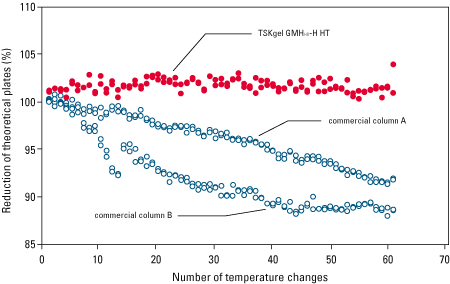TSKgel HT Series Columns
TSKgel H series columns are recommended for the analysis of organic-soluble polymers and are packed with spherical particles composed of polystyrene cross-linked with divinylbenzene (PS-DVB). The TSKgel HT columns are for high temperature applications (<140 ºC), while the TSKgel HT2 columns are used in ultra-high temperature (up to 220 ºC) applications.
The figure below demonstrates the performance stability of the TSKgel GMHhr-H HT columns compared to other commercially available high temperature GPC columns during repetitive temperature changes. The TSKgel Hhr HT columns and two commercially available high temperature GPC columns were subjected to drastic changes in temperature by raising the temperature for 2 hours followed by lowering the temperature for two hours for a total of 60 cycles. The number of theoretical plates was shown to remain constant for the TSKgel Hhr HT columns and to decrease by 15% for the two commercially available high temperature GPC columns; thus revealing the superior performance stability of the TSKgel Hhr HT columns.
Please note: the "GM" prefix denotes a column packed with particles of different pore sizes blended to provide an extended linear calibration curve.
Performance stability of TSKgel GMHHR-HT |
 |
| Column: TSKgel GMHHR-H HT, 5 µm, 7.8 mm ID × 30 cm L × 2;
Mobile phase: ODCB with 0.05% BHT
Flow rate: 1 mL/min;
Detector: RI (EcoSEC High Temperature GPC System);
Temperature: 40 to 145 ˚C |
TSKgel High Temperature columns are for the analysis of organic-soluble polymers. These columns are for applications up to 140°C and are shipped in o-dichlorobenzene (ODCB), which can be exchanged for 1-chloronaphthalene and trichlorobenzene.
The TSKgel mixed bed columns are packed with particles of different pore sizes that are blended to provide an extended linear calibration curve. Mixed bed columns are used when a broad range of polymer molar masses is expected in the sample.
The issue of shearing that occurs with the analysis of ultra-high molar mass polymers is overcome by the TSKgel GMHHR-H(S) HT column. The (S) is a reference to this shearing effect.